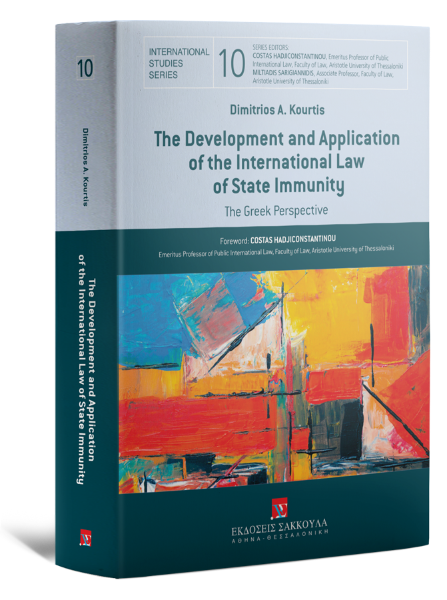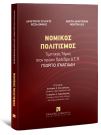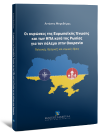D. Kourtis, The Development and Application of the International Law of State Immunity, 2025

The Development and Application of the International Law of State Immunity: The Greek Perspective offers a ground-breaking exploration of how Greece has shaped, contested, and reinterpreted one of the most enduring principles of international law, that of state immunity.
State immunity, the doctrine that shields sovereign states from the jurisdiction of foreign courts and their assets from enforcement measures, stands at the crossroads of sovereignty, sovereign equality, justice, and accountability. Yet, its contours remain fluid, constantly renegotiated through state practice, international and national law-making, and litigation. In this rich and meticulously researched study, Dimitrios A. Kourtis reveals how Greece, though often overlooked in mainstream accounts, has provided a unique and sometimes paradoxical perspective on the law of immunity. From the nineteenth-century foundations of sovereignty to twenty-first-century debates over human rights, reparations, and financial crisis management, the Greek legal order has oscillated between what the author defines as souveraineté sauvage (untamed sovereignty) and souveraineté sage (measured sovereignty).
Drawing on case law, doctrine, and diplomatic practice, the book traces the evolution of Greek engagement with state immunity across pivotal historical and normative moments, including the creation of the Greek state, the two World Wars, the Cold War, the negotiation of international conventions on state immunity by international organisations like the Council of Europe and the United Nations, and sovereign debt crisis of the 2010s. By weaving together theory and practice, this book illuminates how questions of jurisdictional immunity and immunity from enforcement are inseparable from broader struggles over justice, accountability, and the meaning of sovereignty in the modern international legal system.
Scholarly yet accessible, this book will appeal to international lawyers, historians, political scientists, and anyone interested in how a semi-peripheral state can leave an outsized imprint on the international legal discourse.
Edition info
Table of contents +-
Table of Contents
Foreword
Acknowledgments
Abbreviations
Introduction
The Quagmire of State Immunity
Disambiguating Three Concepts: Doctrines or Models of State Immunity, Formative Period, Canonical Narrative
A “House with Many Rooms”: Distinguishing State Immunity
Focus Area of the Study
How Does the Idea Develop?
Some Theoretical Clarifications
Structure of the Study
Chapter
A Greek History of Sovereign Immunity
in the Long Nineteenth Century
1.1. Fundamental Rights and State Genesis: Between the Natural and the Positive
1.2. International Legal Subjectivity
1.3. Sovereignty, Territory, Jurisdiction
1.4. The Zappas Affair
1.5. Othon v. Wright
1.6. The Doctrine of Fundamental Rights of States
1.7. Personal Immunities as the Matrix of Sovereign Immunities?
1.8. Immunity qua Extraterritoriality
1.9. Immunity as a Jurisdictional Conflict
1.10. The Domestic and the International
1.11. Early Greek Law and Jurisprudence
1.12. The International Financial Control
Chapter
The Foundations of Sovereign Immunity
2.1. Introducing the Accounts
2.2. Objective and Subjective Regimes of Sovereign Immunity
2.2.1. Par in Parem
2.2.2. The International Dispute Settlement Rule and the Reserved Domain.
2.2.3. A Subjective Aspect
2.3. Reciprocity
2.3.1. A Brief Introduction
2.3.2. A Russian Account: Soviet Doctrine and the 2015 Law
2.3.3. A Greco-Italian Account: Who Owns Thessaly and Epirus?
2.3.4. A Greco-Spanish Account: The Metaxas Regime and the Spanish Civil War Case Law
2.4. Comity
2.4.1. What’s in a Name?
2.4.2. An American Account: The Schooner Exchange
2.4.3. A British Account: The Parlement Belge
2.4.4. Anzilotti’s Account
2.4.5. The Greek Account: Out with Comity, In with Law
2.4.6. The ICJ’s and the ILC’s Final Word
Chapter
The Greek Theory and Praxis in the Formative Period
3.1. Right or Privilege?
3.1.1. Between the Court and the Parliament
3.1.2. A Hohfeldian Interpretation
3.1.3. A Right of Equality
3.1.4. A Retrospective: The Friendly Relations Declaration
3.2. The Emerging Greek Approach
3.2.1. Sovereign Equality and Fundamental Rights
(a) The Argyrokastritis Case
(b) Streit, Kebedgy, and Sovereign Equality
(c) Fundamental Rights of States
(d) Early Codification Efforts
(e) The American Institute of International Law
(f) The Union juridique internationale
(g) The Institut de Droit International
(h) The United Nations
3.2.2. Rejecting the Bifurcation of a Sovereign State’s Personality
(a) The Typaldos Case
(b) The Romanian Attitude in Zappas
(c) Greece before the Mixed Courts of Egypt
(d) The Kildani Case
(e) A Reappraisal
3.3. A Greek Understanding of Sovereign Immunity
3.3.1. Self-Preservation and Abuse of Right
(a) Seferiades
(b) Tenekides, Spriropoulos, Streit
(c) Carabiber
3.3.2. Sovereignty and Consent
(a) The Bastin Case
(b) The Greek Doctrine
3.3.3. Ascending and Descending Justifications
(a) The Brasseur Case
(b) The A-Corporation Case
(c) From Sage to Sauvage and Back Again
Chapter
From the Absolute to the Restrictive Doctrine
of Sovereign Immunity
4.1. The Restrictive Doctrine: A Canonical Narrative
4.2. The Greco-Soviet Cases: Implied Waiver or Acta Jure Gestionis?
4.2.1. The Modality of Implied Waiver
4.2.2. Greece and the Soviet Union
(a) The First Soviet Immunity Case
(b) The Second Soviet Immunity Case
(c) The Normalisation of Denying Immunity
(d) The Council of State and Soviet Immunity
4.3. The Treaties of Peace and the Greco-German Encounter
4.3.1. Germany, the Görlitz “Guests”, and the Treaty of Versailles
(a) The German Position
(b) The Görlitz ”Guest” Case
(c) Article 281 of the Treaty of Versailles
4.3.2. The Greco-German Mixed Arbitral Tribunal and State Immunity
(a) The Post-War Mixed Arbitral Tribunals
(b) The Legal Nature of the Mixed Arbitral Tribunals
(c) The Greco-German Mixed Arbitral Tribunal
4.3.3. The Case Law
(a) The Karmatzucas Case
(b) Subsequent Judgments
(c) The Problem of State Practice
(d) The Salamis Case
4.4. A Reappraisal of the Greek Approach between the Two World Wars
4.4.1 The Courts
4.4.2. The State before its Courts
4.4.3. The Legislator and the Legal System
4.4.4. The Government
Chapter
The Modern Sources of the Law
of State Immunity and the Greek Perspective
5.1. Customary International Law and Domestic Law
5.1.1. Immunity, Practice, and Performativity
5.1.2. Opinio Juris(?)
5.2. Greece’s Attitude
5.2.1. A Rule of Customary International Law
(a) Socobelge
(b) Julius Bär & Cie
(c) La Mercantile
(d) Gamet (I & II)
5.2.2. Greece’s Internal Attitude
(a) Civil Procedural Law
(b) Immunity and the Constitution
5.3. Codification Projects: Intergovernmental Initiatives
5.3.1. The League of Nations
5.3.2. The United Nations
(a) The Greek Position
(b) The First Special Rapporteur and the Greek Praxis
(c) The Second Special Rapporteur and the Greek Voice in the
(d) From the ILC to the UNGA
(e) Immunity as Necessary Evil
(f) The Ad Hoc Committee
5.3.3. The Council of Europe
(a) Setting the Scene
(b) An Overview
(c) Greece’s Participation in the Drafting
Chapter
Exceptions to Sovereign Immunity
under the Restrictive Doctrine
6.1. An Overview of the Greek Approach
6.1.1. Sanctioning L’Etat commerçant
6.1.2. Greek Jurisprudence
6.1.3. Absence of Immunity Statute(s)
6.1.4. Some Positive Developments
6.2. Acta Jure Gestionis or Non-Immune State Transactions
6.2.1. The Proper Criterion
(a) Nature versus Purpose
(b) Form or Type of the Transaction
(c) A Qualified Nature-Based Approach
6.2.2. Markesinis’s Multiple Systems
(a) Actes d’autorité and actes de gestion
(b) Commerciality
(c) Commerciality qua Equality
(d) Procedures of Private Law
(e) Actor-Based Approaches
6.2.3. Defining the “State” in the Law of Immunity
(a) The UNCSI Formula
(b) The Juridical Person of the State
(c) Sub-State Entities
(d) Natural Persons
(e) Separate Entities, Other Agencies, and Instrumentalities of the State
(f) The French and German Approaches
(g) The Greek Approach
6.3. The Nature Test in Greek Praxis
6.3.1. A Matter of Customary International Law
(a) An Overly Cautious Approach
(b) The Romanian Legation Case
6.3.2. Between Nature and Purpose
(a) The Internationalist Approach and the Indirect Effect Doctrine
(b) Legal Forms Redux
(c) Judicial Oscillation
(d) A Combined Approach
6.3.3. The Modern Greek Approach
(a) The Ascendancy of the Lex Fori
(b) The US Visiting Forces’ Immunity Controversy
(c) Governmental Practice (I): The Legal Council of State
(d) Governmental Practice (II): The Question of Nationalisation
Chapter
The Territorial Tort Exception
7.1. Preliminary Issues
7.1.1. The General Understandings
7.1.2. Criminal Proceedings
7.1.3. Activities of the Armed Forces
7.2. The Greek Servicemen Case Law
7.2.1. Applicable Legal Framework
(a) Service Commandé
(b) The Egyptian Position
(c) The Triandafilou Case
(d) The Gaitanos, Orfanidis, and Sarnazos Cases
(e) The Stamatopoulos Case
(f) The Tsoukharis and Gounaris Cases
(g) Purpose and Nature
7.2.2. Immunity from Civil Suit
(a) The Abouteboul Case – Background
(b) Polys Modinos and the Egyptiote Community
(c) The Abouteboul Case – Service Commandé
(d) The Rights of States and the Rights of Individuals
7.3. The Territorial Tort Exception in the Draft Articles
7.3.1. Status of Visiting Forces
7.3.2. ECSI-Related Practice
7.3.3 The First Special Rapporteur
7.3.4. The Second Special Rapporteur
7.3.5. The Greek Approach
7.3.6. The Adoption of the Draft Articles
7.4. The Territorial Tort Exception in Later Stages
7.4.1. The ILC’s Working Group, Jus Cogens, and American Practice.
7.4.2. The Sixth Committee’s Working Group
7.4.3. The Ad Hoc Committee
7.4.4. The Chairman’s Statement to the Sixth Committee
7.4.5. A Proposed Understanding
7.4.6. Military Activities Encompassed by UNCSI
Chapter
The Greek Application of the Restrictive Doctrine
8.1. The State qua Private Person
8.1.1. The “Private Person” Test
8.1.2. Domestic Applications
8.1.3. Greece as a Defendant
8.2. Employment Contracts
8.2.1. The American Visiting Forces Case Law
(a) The British Armed Forces
(b) The USMG
(c) NATO SOFA
(d) The 1956 Bilateral SOFA
(e) The Early Case Law
(f) Restrictive Immunity in Employment and Freelance Disputes
8.2.2. Other Labour Law Disputes
8.3. Sovereign Debt and Sovereign Bonds
8.3.1. The General Framework
8.3.2. The Cases against Argentina
8.3.3. The Greek Sovereign Debt-Related Case Law
(a) Early Practice
(b) The Greek Debt Crisis and the PSI
(c) The Basis for Domestic Litigation
(d) Fahnenbrock and the German Case Law
(e) Kuhn and the Austrian Case Law
8.4. Waiver and Consent
8.4.1. An Overview
(a) Counterclaims
(b) Conditions for Waiving Immunity
(c) The Irrevocability and Comprehensiveness of Waiver
(d) Multilateral Instruments, Consent to Arbitrate, and Implicit Waiver
(e) The ICSID Convention
(d) The New York Convention
8.4.2. Waiver in the Greek Practice
(a) Conditions of Validity
(b) The Approach of Greek International Lawyers
(c) Petrol Shipping Corporation v. Kingdom of Greece
Chapter
Immunity from Enforcement Measures
9.1. An Overview of the Existing Framework
9.1.1. ECSI and UNCSI
9.1.2. The Rule of Untouchable State Property
9.2. The Greek System of Enforcement
9.2.1. The General Characteristics
9.2.2. The Law and Doctrine of Restrictive Immunity from Enforcement
(a) Early Approaches
(b) Subsequent Doctrinal Elaboration
9.2.3. The Three Phases in the Evolution of Article 923 CCP (and Its Analogues)
(a) The Initial Phase (1950s–1960s)
(b) The Normalisation Phase (1970s–1990s)
(c) The Phase of Scrutiny (2000s)
(d) The Distomo Case: Domestic Courts and the Government
(e) The Distomo Case: The Strasbourg Court
(f) The Distomo Case: The Human Rights Committee
(g) The Vlastos v. Iraq Case
(h) A Proposed Interpretation
9.2.4. The IPC and Article 923 CCP
(a) The Distomo Litigation Saga (I): Germany
(b) The Distomo Litigation Saga (II): Italy
(c) The Distomo Litigation Saga (III): The Hague
(d) The Distomo Litigation Saga (IV): Italy Redux
(e) The IPC
(f) A Reappraisal
9.2.5. Waiver of Immunity from Enforcement
(a) Waiver Clauses and the Practice of International Transactions
(b) Waiver Clauses and State Sovereignty
(c) Waiver Clauses and Contestation
(d) Some Examples from Prior Greek Practice
(e) A Few Intermediary Remarks
9.2.6. Waiver Clauses in the First Greek Financial Assistance Agreement
(a) Pre-Crisis Greek Practice
(b) The 2010 LFA and the Ensuing Controversy
(c) A Few Retrospective Observations
(d) Souveraineté Sauvage et Administration Sage
Chapter
Grey Areas: Jus Cogens, Abuse of Rights, and Other Modalities
10.1. Substance and Procedure
10.1.1. Immunities and the Brechtian Dilemma
(a) The ICJ’s Approach
(b) An International Dispute to Be Settled
(c) On the Absoluteness of the Distinction
10.1.2. Equality of States – Hierarchical Inequality of Norms
(a) Limitations
(b) Arguments from the Area of Immunity of State Officials from Foreign Criminal Jurisdiction
(c) The “Last Resort” Argument
(d) Legal Reasoning and Direction-of-Fit
10.2. The Distomo Grounds Revisited
10.2.1. Introductory Remarks
(a) Pre-Distomo Judgments
(b) A “Triple Overreach”
(c) The Social Context
10.2.2. “Constructive” Waiver and Relevant Arguments
(a) Siderman and Distomo
(b) The Distomo Ratio Decidendi
(c) The Textual Sources of the Distomo Judgment
(d) International Crimes as Acta Jure Gestionis?
(e) A Critique
10.2.3. Abuse of Right
(a) Some General Observations
(b) The Judgment of the Court of Cassation
(c) Abuse and Normative Hierarchy
(d) The Slippery Slope of Bad Faith
(e) A Critique
10.3. The Margellos Judgment of the Supreme Special Court
10.3.1. The Seisin of the Supreme Special Court
(a) Governmental Ambivalence
(b) Pre-Judgment Doctrinal Debate
10.3.2. The Judgment and its Aftermath
(a) The Reasoning
(b) The Judgment’s Freezing Effect
(c) The Mega Theoxenia Hotel Case
(d) The Ransom of the Jewish Community of Thessaloniki Case
10.4. The Reception of Italian Arguments in Greece: The Simoncioni Reasoning and “Judicial Countermeasures”
10.4.1. Between Simoncioni and Ferrini
(a) Greek International Lawyers and the Simoncioni Reasoning
(b) A Simoncioni alla Greca?
(c) Italian War Crimes and the Missed Simoncioni Moment
(d) The IPC Majority Report
10.4.2. “Judicial Countermeasures”
(a) A Tenuous Concept
(b) A Hint for Executive Action
(c) Some Final Remarks
Conclusions
Table of Cases
Permanent Court of International Justice
International Court of Justice
Other International Courts and Tribunals
European Court and Commission of Human Rights
Other Human Rights Bodies
Court of Justice of the European Union
Arbitral Awards
Mixed Arbitral Tribunals
Domestic Courts and Tribunals
Argentina
Australia
Austria
Belgium
Brazil
Canada
Chile
Cyprus
Czech Republic
Denmark
Egypt
France
Germany
Ghana
Greece
India
Ireland
Israel
Italy
Japan
New Zealand
Nigeria
Norway
Philippines
Poland
Russian Federation
Slovenia
Spain
Sweden
Switzerland
The Netherlands
Ukraine
United Kingdom
United States
Bibliography
Index of terms





















